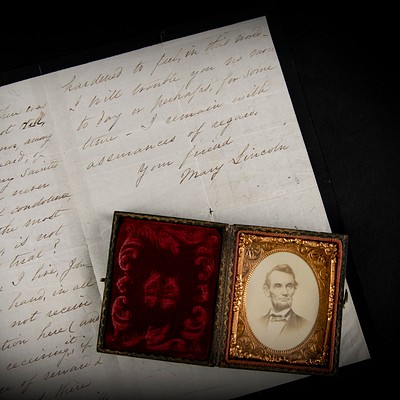Charles de Gaulle Autograph Letter Signed
Two ways to bid:
- Leave a max absentee bid and the platform will bid on your behalf up to your maximum bid during the live auction.
- Bid live during the auction and your bids will be submitted real-time to the auctioneer.
Bid Increments
| Price | Bid Increment |
|---|---|
| $0 | $5 |
| $50 | $10 |
| $200 | $25 |
| $500 | $50 |
About Auction
Feb 8, 2023
RR Auction support@rrauction.com
- Lot Description
ALS signed “Charles,” ten pages three sets of adjoining sheets, 5.25 x 7, December 3, 1939. Handwritten letter to a friend, commenting on his new understanding of Adolf Hitler's designs following a reading of Mein Kampf, and anxiously observing the readiness of Russian forces to the east. In full (translated): "The events of the last days of November have apparently put the General Staff on alert and the lies which reach me suggest a redeployment of our forces without a better use of mechanical weapons on the ground being considered.
Will this war finally begin? I measure all your anguish, you two of whose sons are waiting for the moment to defend the fatherland, and as a father, I share it. I intend to say that the absence of a second front to the east will force us to contain the entire German army, that the French and the English will once again be faced with History and its recurrences. This is a point of view that I do not share, because it would be to misunderstand Hitler's intentions.
You who, like me, have read his writings and his works [Mein Kampf], know that the new Germany promised to the German people cannot exist if the powerful Russia remains in its eastern marches.
The maneuvers carried out by Stalin in Finland and the flaws in the command demonstrate the unpreparedness of the Russian soldiers and their structural weaknesses. By letting his ally wage his own war, the Chancellor and his generals have a remarkable vantage point. This war will be a long one, the time we waste today others are utilizing. History and future generations will never understand that such a large army, uniting the two most powerful countries in the world, preferred waiting to action, thus leaving the enemy the opportunity to organize the front at its sole convenience.
My meeting with Daladier [Édouard Daladier, Prime Minister of France who signed the Munich Agreement prior to WWII] was once again postponed without any other date being offered. This is a habit I don't like to be forced into. We are talking about France, the France that five million men are preparing to defend and its officers sit in the waiting rooms in the ministerial salons.
I come to wonder about the interest displayed for the President of the Council to see Colonel de Gaulle present to him in person his theories on the fair and proper use of modern weapons. Reynaud has done his best everywhere. I send you my dear Antoine my best memories." In very good to fine condition, with a partial split to the horizontal fold on the second sheet.
Although France had declared war on Germany three months prior, very little fighting had occurred after Germany's initial blitzkrieg attack on Poland in September. The period came to be known as the 'Phoney War,' or 'drôle de guerre,' and prompted de Gaulle's inquiry in this letter: "Will this war finally begin?" In the meantime, the Soviets launched an offensive against Finland, and the the Winter War commenced on November 30, 1939—the "events of the last days of November" that put French officials on high alert.
In this remarkable, prescient letter, de Gaulle shares his new understanding of Hitler's motives and intentions, while also commenting on the inadequate preparedness of forces at home and abroad. He feels that the Russian army has revealed itself to be structurally inept in Finland, and is troubled by the lackadaisical response of the French and English governments. Further, he knew that the French army would be outgunned by its enemies. De Gaulle had long been an advocate for the development of a modern, mechanized professional army, but met resistance at the highest levels of government. Politician Paul Reynaud, who he mentions here, had been the greatest champion for a robust armored corps within France's political ranks, but had made little progress.
In spite of de Gaulle's best efforts, the nation's ill-equipped forces would be overrun by Wehrmacht troops in May and June, leading to French surrender. De Gaulle fled to safety in London, where he established the 'Free France' government-in-exile and supported the resistance in Nazi-occupied France. - Shipping Info
-
Bidder is liable for shipping and handling and providing accurate information as to shipping or delivery locations and arranging for such. RR Auction is unable to combine purchases from other auctions or affiliates into one package for shipping purposes. Lots won will be shipped in a commercially reasonable time after payment in good funds for the merchandise and the shipping fees are received or credit extended, except when third-party shipment occurs. Bidder agrees that service and handling charges related to shipping items which are not pre-paid may be charged to a credit card on file with RR Auction. Successful international Bidders shall provide written shipping instructions, including specified Customs declarations, to RR Auction for any lots to be delivered outside of the United States. NOTE: Declaration value shall be the item’(s) hammer price and RR Auction shall use the correct harmonized code for the lot. Domestic Bidders on lots designated for third-party shipment must designate the common carrier, accept risk of loss, and prepay shipping costs.
-
- Buyer's Premium



 EUR
EUR CAD
CAD AUD
AUD GBP
GBP MXN
MXN HKD
HKD CNY
CNY MYR
MYR SEK
SEK SGD
SGD CHF
CHF THB
THB



















